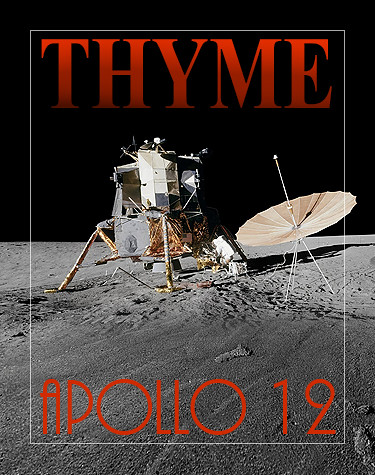
Volume XVII, Issue XVII, XVIII: Special Edition
Today’s DOUBLE ISSUE gives you two weeks’ reading as I step back from weekly publication to devote myself to several important projects. I hope you enjoy it.
The Journeys of Apollo
The heavens declare the glory of God; and the firmament sheweth his handywork. Day unto day uttereth speech, and night unto night sheweth knowledge. There is no speech nor language, where their voice is not heard.” – PSALM 19:1-3
First Paintings of Another World
By an Artist Who was Actually There, Alan Bean
[click to read]
I was the Lunar Module Pilot of Apollo 12 and the fourth man to set foot on the moon. I explored the beautifully desolate landscape of the Ocean of Storms and later, as commander of Skylab 3 (Skylab Mission II), I spent 59 days in orbit around our fragile, blue-and-white Earth.
I had been painting earthbound subjects for many years by the time I returned from Apollo 12 and Skylab 3 missions, but my fellow astronauts convinced me to paint my experiences on the moon.
You can create the very first paintings in all of history of a place other than our own planet,” they said. “Your paintings will forever be the first paintings of the many other worlds humans will visit as the centuries unfold.”
Because of this unprecedented opportunity and challenge, I resigned from NASA in 1981 to devote all of my time and energy to painting, celebrating the great exploration that was Apollo.
Over the years, my art has evolved into a mixture of painting and sculpture, textured with my lunar tools, sprinkled with bits of our Apollo 12 spacecraft and a touch of moondust from the Ocean of Storms. You can see many of my paintings on this site and read more about the space-age techniques and materials I use in my work. (read more)
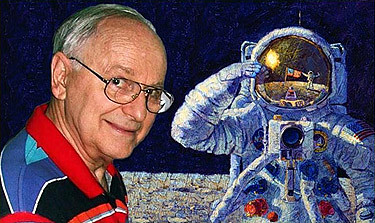
The Alan Bean Gallery.
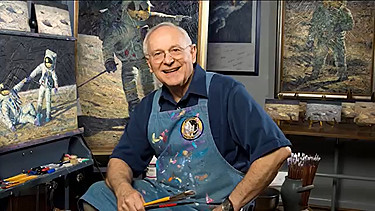
In the video: Astronaut Alan Bean, Moonwalker, Skylab Commander, Artist at the bottom of today's THYME, we learn how an astronaut's incredible observations led to a wonderful exploration in art!
Incredible Journey of Apollo 12
Seeing Things in 'Living Color'
I need a mathematician that can look beyond the numbers, a math that doesn't yet exist..."
-- Al Harrison in Hidden Figures
My colleague and I just were part of a very interesting discussion of 'lucid dreaming.' It seems there was a study some years ago where participants 'taught' themselves to dream lucidly using sound waves called binural beats. Supposedly the medical students who were the subjects of this study achieved higher grades because they were 'practicing surgeries/outcomes in their sleep.' While this would be hard to substantiate, it does open the fascinating discussion on the place of the human imagination in achieving outcomes.
In my youth, there was an idea floating around that 'sleep learning' would be the wave of the future as lessons would be fed to students as they slumbered. Nothing much ever came out of this.
But the training and use of vivid imagination, however, may indeed be the 'wave of the future.' To find it, however, may require a journey to the past. I recently watched the movie: Hidden Figures, and was fascinated as mathematician Katherine Johnson and her colleagues at NASA are stymied by the problem of calculating a transition from elliptical orbit to a parabolic descent. No modern mathematics would adequately calculate it. Katherine was a mathematical savant however and she dug deep into some antiquated equations to find the answer. She was a mathematician with imagination!
Industrialist R. G. LeTourneau once hit a roadblock, along with his team of engineers as they tried to design a machine to lift airplanes. He left the workgroup one Wednesday evening to go to a prayer meeting. His colleagues protested, reminding him that they had a deadline to meet. Walking home from the prayer meeting, LeTourneau says that he 'saw' the needed design in his mind!
And so we arrive at the wonderful consideration of the place of vivid imagination as an instructor. C. S. Lewis found inspiration in the world of wonder opened to him by a rather lucid observation of nature and the works of Scottish fantasy writer: George MacDonald. Although MacDonald has fallen from favor with some scholars, there is renewed interest in his work, much of which is now in the public domain and so can be here presented. (h/t Kristina Elaine Greer)
(to be continued)
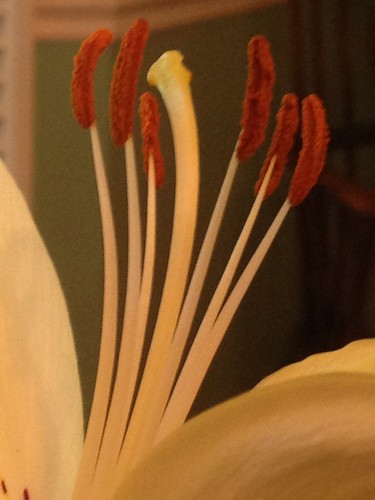
Photo by Bob Kirchman
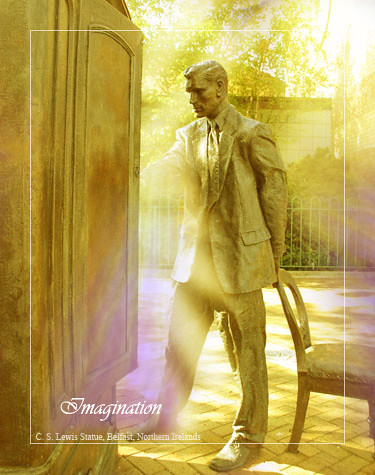
C. S. Lewis was influenced by the work of George MacDonald.
The Fantastic Imagination
Excerpt from A Dish of Orts (scraps)
By George MacDonald
That we have in English no word corresponding to the German Mährchen, drives us to use the word Fairytale, regardless of the fact that the tale may have nothing to do with any sort of fairy. The old use of the word Fairy, by Spenser at least, might, however, well be adduced, were justification or excuse necessary where need must.
Were I asked, what is a fairytale? I should reply, Read Undine: that is a fairytale; then read this and that as well, and you will see what is a fairytale. Were I further begged to describe the fairytale, or define what it is, I would make answer, that I should as soon think of describing the abstract human face, or stating what must go to constitute a human being. A fairytale is just a fairytale, as a face is just a face; and of all fairytales I know, I think Undine the most beautiful.
Many a man, however, who would not attempt to define a man, might venture to say something as to what a man ought to be: even so much I will not in this place venture with regard to the fairytale, for my long past work in that kind might but poorly instance or illustrate my now more matured judgment. I will but say some things helpful to the reading, in right-minded fashion, of such fairytales as I would wish to write, or care to read.
Some thinkers would feel sorely hampered if at liberty to use no forms but such as existed in nature, or to invent nothing save in accordance with the laws of the world of the senses; but it must not therefore be imagined that they desire escape from the region of law. Nothing lawless can show the least reason why it should exist, or could at best have more than an appearance of life.
The natural world has its laws, and no man must interfere with them in the way of presentment any more than in the way of use; but they themselves may suggest laws of other kinds, and man may, if he pleases, invent a little world of his own, with its own laws; for there is that in him which delights in calling up new forms--which is the nearest, perhaps, he can come to creation. When such forms are new embodiments of old truths, we call them products of the Imagination; when they are mere inventions, however lovely, I should call them the work of the Fancy: in either case, Law has been diligently at work.
His world once invented, the highest law that comes next into play is, that there shall be harmony between the laws by which the new world has begun to exist; and in the process of his creation, the inventor must hold by those laws. The moment he forgets one of them, he makes the story, by its own postulates, incredible. To be able to live a moment in an imagined world, we must see the laws of its existence obeyed. Those broken, we fall out of it. The imagination in us, whose exercise is essential to the most temporary submission to the imagination of another, immediately, with the disappearance, of Law, ceases to act. Suppose the gracious creatures of some childlike region of Fairyland talking either cockney or Gascon! Would not the tale, however lovelily begun, sink at once to the level of the Burlesque--of all forms of literature the least worthy? A man's inventions may be stupid or clever, but if he do not hold by the laws of them, or if he make one law jar with another, he contradicts himself as an inventor, he is no artist. He does not rightly consort his instruments, or he tunes them in different keys. The mind of man is the product of live Law; it thinks by law, it dwells in the midst of law, it gathers from law its growth; with law, therefore, can it alone work to any result. Inharmonious, unconsorting ideas will come to a man, but if he try to use one of such, his work will grow dull, and he will drop it from mere lack of interest. Law is the soil in which alone beauty will grow; beauty is the only stuff in which Truth can be clothed; and you may, if you will, call Imagination the tailor that cuts her garments to fit her, and Fancy his journeyman that puts the pieces of them together, or perhaps at most embroiders their button-holes. Obeying law, the maker works like his creator; not obeying law, he is such a fool as heaps a pile of stones and calls it a church.
In the moral world it is different: there a man may clothe in new forms, and for this employ his imagination freely, but he must invent nothing. He may not, for any purpose, turn its laws upside down. He must not meddle with the relations of live souls. The laws of the spirit of man must hold, alike in this world and in any world he may invent. It were no offence to suppose a world in which everything repelled instead of attracted the things around it; it would be wicked to write a tale representing a man it called good as always doing bad things, or a man it called bad as always doing good things: the notion itself is absolutely lawless. In physical things a man may invent; in moral things he must obey--and take their laws with him into his invented world as well.
You write as if a fairytale were a thing of importance: must it have a meaning?"
It cannot help having some meaning; if it have proportion and harmony it has vitality, and vitality is truth. The beauty may be plainer in it than the truth, but without the truth the beauty could not be, and the fairytale would give no delight. Everyone, however, who feels the story, will read its meaning after his own nature and development: one man will read one meaning in it, another will read another.
If so, how am I to assure myself that I am not reading my own meaning into it, but yours out of it?"
Why should you be so assured? It may be better that you should read your meaning into it. That may be a higher operation of your intellect than the mere reading of mine out of it: your meaning may be superior to mine.
Suppose my child ask me what the fairytale means, what am I to say?"
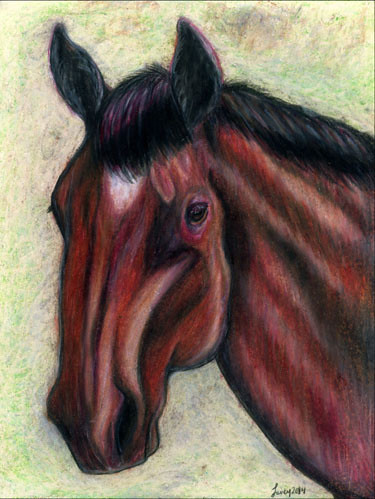
Illustration by Kristina Elaine Greer.
If you do not know what it means, what is easier than to say so? If you do see a meaning in it, there it is for you to give him. A genuine work of art must mean many things; the truer its art, the more things it will mean. If my drawing, on the other hand, is so far from being a work of art that it needs THIS IS A HORSE written under it, what can it matter that neither you nor your child should know what it means? It is there not so much to convey a meaning as to wake a meaning. If it do not even wake an interest, throw it aside. A meaning may be there, but it is not for you. If, again, you do not know a horse when you see it, the name written under it will not serve you much. At all events, the business of the painter is not to teach zoology.
But indeed your children are not likely to trouble you about the meaning. They find what they are capable of finding, and more would be too much. For my part, I do not write for children, but for the childlike, whether of five, or fifty, or seventy-five.
A fairytale is not an allegory. There may be allegory in it, but it is not an allegory. He must be an artist indeed who can, in any mode, produce a strict allegory that is not a weariness to the spirit. An allegory must be Mastery or Moorditch.
A fairytale, like a butterfly or a bee, helps itself on all sides, sips at every wholesome flower, and spoils not one. The true fairytale is, to my mind, very like the sonata. We all know that a sonata means something; and where there is the faculty of talking with suitable vagueness, and choosing metaphor sufficiently loose, mind may approach mind, in the interpretation of a sonata, with the result of a more or less contenting consciousness of sympathy. But if two or three men sat down to write each what the sonata meant to him, what approximation to definite idea would be the result? Little enough--and that little more than needful. We should find it had roused related, if not identical, feelings, but probably not one common thought. Has the sonata therefore failed? Had it undertaken to convey, or ought it to be expected to impart anything defined, anything notionally recognizable?
But words are not music; words at least are meant and fitted to carry a precise meaning!"
It is very seldom indeed that they carry the exact meaning of any user of them! And if they can be so used as to convey definite meaning, it does not follow that they ought never to carry anything else. Words are live things that may be variously employed to various ends. They can convey a scientific fact, or throw a shadow of her child's dream on the heart of a mother. They are things to put together like the pieces of a dissected map, or to arrange like the notes on a stave. Is the music in them to go for nothing? It can hardly help the definiteness of a meaning: is it therefore to be disregarded? They have length, and breadth, and outline: have they nothing to do with depth? Have they only to describe, never to impress? Has nothing any claim to their use but the definite? The cause of a child's tears may be altogether undefinable: has the mother therefore no antidote for his vague misery? That may be strong in colour which has no evident outline. A fairytale, a sonata, a gathering storm, a limitless night, seizes you and sweeps you away: do you begin at once to wrestle with it and ask whence its power over you, whither it is carrying you? The law of each is in the mind of its composer; that law makes one man feel this way, another man feel that way. To one the sonata is a world of odour and beauty, to another of soothing only and sweetness. To one, the cloudy rendezvous is a wild dance, with a terror at its heart; to another, a majestic march of heavenly hosts, with Truth in their centre pointing their course, but as yet restraining her voice. The greatest forces lie in the region of the uncomprehended.
I will go farther.--The best thing you can do for your fellow, next to rousing his conscience, is--not to give him things to think about, but to wake things up that are in him; or say, to make him think things for himself. The best Nature does for us is to work in us such moods in which thoughts of high import arise. Does any aspect of Nature wake but one thought? Does she ever suggest only one definite thing? Does she make any two men in the same place at the same moment think the same thing? Is she therefore a failure, because she is not definite? Is it nothing that she rouses the something deeper than the understanding--the power that underlies thoughts? Does she not set feeling, and so thinking at work? Would it be better that she did this after one fashion and not after many fashions? Nature is mood-engendering, thought-provoking: such ought the sonata, such ought the fairytale to be.
But a man may then imagine in your work what he pleases, what you never meant!"
Not what he pleases, but what he can. If he be not a true man, he will draw evil out of the best; we need not mind how he treats any work of art! If he be a true man, he will imagine true things; what matter whether I meant them or not? They are there none the less that I cannot claim putting them there! One difference between God's work and man's is, that, while God's work cannot mean more than he meant, man's must mean more than he meant. For in everything that God has made, there is layer upon layer of ascending significance; also he expresses the same thought in higher and higher kinds of that thought: it is God's things, his embodied thoughts, which alone a man has to use, modified and adapted to his own purposes, for the expression of his thoughts; therefore he cannot help his words and figures falling into such combinations in the mind of another as he had himself not foreseen, so many are the thoughts allied to every other thought, so many are the relations involved in every figure, so many the facts hinted in every symbol. A man may well himself discover truth in what he wrote; for he was dealing all the time with things that came from thoughts beyond his own.
But surely you would explain your idea to one who asked you?"
I say again, if I cannot draw a horse, I will not write THIS IS A HORSE under what I foolishly meant for one. Any key to a work of imagination would be nearly, if not quite, as absurd. The tale is there, not to hide, but to show: if it show nothing at your window, do not open your door to it; leave it out in the cold. To ask me to explain, is to say, "Roses! Boil them, or we won't have them!" My tales may not be roses, but I will not boil them.
So long as I think my dog can bark, I will not sit up to bark for him.
If a writer's aim be logical conviction, he must spare no logical pains, not merely to be understood, but to escape being misunderstood; where his object is to move by suggestion, to cause to imagine, then let him assail the soul of his reader as the wind assails an aeolian harp. If there be music in my reader, I would gladly wake it. Let fairytale of mine go for a firefly that now flashes, now is dark, but may flash again. Caught in a hand which does not love its kind, it will turn to an insignificant, ugly thing, that can neither flash nor fly.
The best way with music, I imagine, is not to bring the forces of our intellect to bear upon it, but to be still and let it work on that part of us for whose sake it exists. We spoil countless precious things by intellectual greed. He who will be a man, and will not be a child, must--he cannot help himself--become a little man, that is, a dwarf. He will, however, need no consolation, for he is sure to think himself a very large creature indeed.
If any strain of my "broken music" make a child's eyes flash, or his mother's grow for a moment dim, my labour will not have been in vain.
The paper on The Fantastic Imagination had its origin in the repeated request of readers for an explanation of things in certain shorter stories I had written. It forms the preface to an American edition of my so-called Fairy Tales. -- George MacDonald
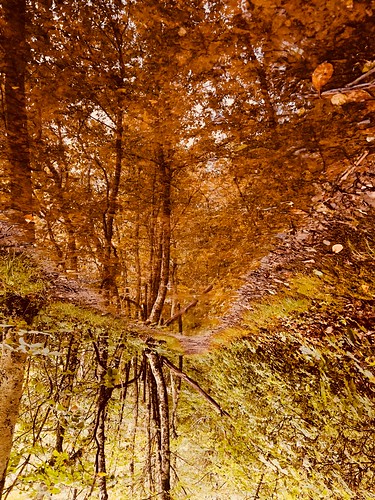
'Wood Between the Worlds.' Photo by Bob Kirchman.
The Joy of Sauntering

John Muir. Public Domain.
Hiking - "I don't like either the word or the thing. People ought to saunter in the mountains - not hike! Do you know the origin of that word 'saunter?' It's a beautiful word. Away back in the Middle Ages people used to go on pilgrimages to the Holy Land, and when people in the villages through which they passed asked where they were going, they would reply, 'A la sainte terre,' 'To the Holy Land.' And so they became known as sainte-terre-ers or saunterers. Now these mountains are our Holy Land, and we ought to saunter through them reverently, not 'hike' through them."
- John Muir
The Smartest Horse that Ever Lived
A True Story
More than simply the biography of an unusual sideshow act, Beautiful Jim Key by Mim Eichler Rivas takes a thorough look at American history from before the Civil War to the mid-20th century, examining race relations, World’s Fair and exposition history, and the development of the humane movement. The story centers around the “Arabian-Hambletonian educated horse” Beautiful Jim Key, his breeder William Key, who was a business-savvy former slave, and their promoter, Albert Rogers, a privileged young New Yorker who aspired to being a philanthropist. (read more)
Jesus, Horses, Healing
Risen Ridge Ministry

Dezi, Socks and Maple graze at Risen Ridge Ministry. This Spring they will begin providing ministry sessions. Photo by Jen Beck.
Horses have an amazing way of communicating. They are honest, gentle, and encouraging. In a horse ministry, people who are seeking healing through the love of Jesus will come and find it through a relationship with a horse and a facilitator. They will learn what it is like to care for another's well being, and what it feels like to have an honest relationship based on love. Horses don't care about your past or what you look like. Over and over, the horse will see you for who you really are, whom God created you to be. The experiences will demonstrate that God's love never fails, can bring restoration, and how we all have value. (read more)
I will restore you to health and heal your wounds, declares the Lord.” - Jeremiah 30:17
Astronaut Alan Bean
Moonwalker, Skylab Commander, Artist
Apollo 12, Pinpoint for Science
Tolkien And The Eucharist In “Lord of the Rings”
[click to read]
This lecture was given by Prof. Peter Kreeft (Boston College) at Rutgers University on 8 October 2019. Dr. Peter Kreeft is a professor of philosophy at Boston College and teaches philosophy courses at King’s College. Kreeft is a popular writer of Christian philosophy, theology and apologetics and the author of dozens of books, two of which include The Philosophy of Tolkien: The Worldview Behind the Lord of the Rings and Symbol or Substance: A Dialogue on the Eucharist with C. S. Lewis, Billy Graham and J. R. R. Tolkien. (read more)
My Cathedral in Autumn
Photos by Bob Kirchman



Honoring Our Veterans

Students at United Christian Academy in Stanardsville, Virginia created this display of flags to honor our veterans. Photo by Walter R. Key.
